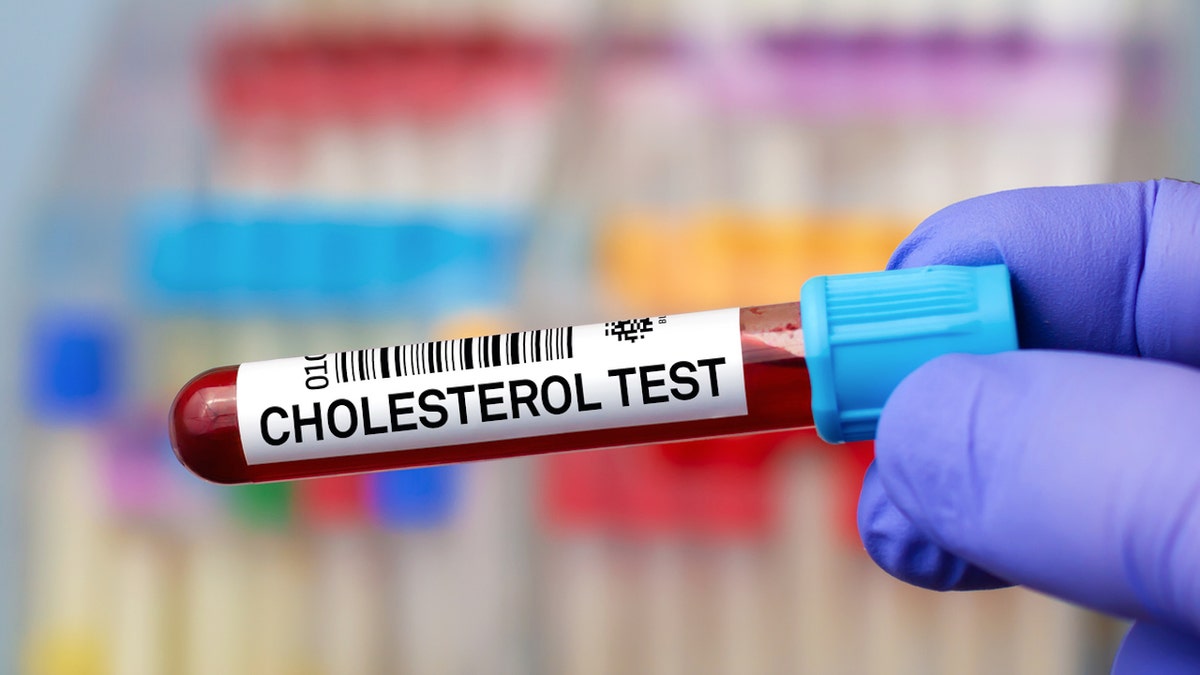
Cholesterol has some important jobs in the body — such as creating hormones, aiding digestion, building cell membranes and generating vitamin D — but too much of the waxy substance can pose a health risk.
“Cholesterol only becomes problematic when cholesterol levels — and particularly LDL cholesterol — become too high,” said Dr. Robert Pilchik, a cardiologist with Manhattan Cardiology and contributor to LabFinder.com, in a statement to Fox News Digital.
“As total cholesterol and triglyceride levels increase, plaque begins to build up in the blood vessels and arteries,” he went on.
“This increases blood pressure, puts strain on the cardiovascular system and increases the risk of heart disease, heart attack and stroke.”
HEART DRUG COMBINING 3 MEDICATIONS IN ONE IS ADDED TO WORLD HEALTH ORGANIZATION’S LIST OF ESSENTIAL MEDICINES
The best way to avoid these effects is to prevent high blood cholesterol to begin with.
Pilchik, who has expertise in cardiovascular disease and nuclear cardiology, offered six tips to keep it at a healthy level.
1. Make dietary changes
The first and perhaps most controllable way to prevent high cholesterol is to make healthy food choices, Pilchik said.

Dr. Robert Pilchik, a cardiologist with Manhattan Cardiology and contributor to LabFinder.com, offered six tips for managing cholesterol levels. (Dr. Robert Pilchik-Manhattan Cardiology/iStock)
He recommended avoiding foods that are high in:
- Saturated fat
- Trans-fatty acids (trans fats)
- Sodium (salt)
- Added sugars
HEART-HEALTHY FOODS: 15 ITEMS TO ADD TO YOUR GROCERY LIST TO PREVENT HEART DISEASE, OTHER HEALTH CONCERNS
“Instead, try to consume a diet high in fiber and unsaturated fat,” the doctor suggested.
“The Mediterranean diet is often a good choice, as it shifts focus away from dairy and red meat and onto seafood, fruits and vegetables, nuts and seeds, and whole grains.”
2. Ramp up physical activity
“In the United States today, there are an extraordinary amount of people who are not maintaining what would be considered a healthy amount of physical activity,” said Pilchik.
JUST 11 MINUTES OF EXERCISE CAN REDUCE EARLY DEATH RISK, RESEARCHERS FIND
Adults need at least 2.5 hours of moderate physical activity per week, he noted, while children and adolescents need at least one hour per day.
This can include moderately paced walks, cycling or other types of exercise that maintain an elevated heart rate.

Adults need at least 2.5 hours of moderate physical activity per week, while children and adolescents need at least one hour per day, said Dr. Pilchik. (iStock)
“Exercise can be habitual, and forming habits early can be helpful for preventing health issues later in life,” said Pilchik.
3. Maintain a healthy weight
Maintaining a healthy weight has numerous health benefits, one of which is improving the body’s ability to use and remove excess blood cholesterol, according to Pilchik.
“While not a perfect tool, a body mass index (BMI) calculator can help indicate whether a person’s weight is healthy or not,” he said.
AI HEART SCAN AIMS TO CATCH BLOCKAGES YEARS BEFORE SYMPTOMS: ‘UNBELIEVABLE BREAKTHROUGH’
For those who have a weight loss goal, the safest and most effective approach is a combination of dietary choices and physical activity.
“A doctor can help determine if specific weight loss goals or plans are safe to pursue,” Pilchik said.
4. Avoid smoking
“Smoking is generally very hard on a person’s cardiovascular system on its own, and the effects can be exacerbated by high cholesterol,” said Pilchik.

For those who smoke, quitting can ease strain on the heart and allow some amount of healing, Pilchik said. (iStock)
For people who have never smoked or who have already quit the habit, maintaining that lifestyle can be beneficial for heart health.
For those who do smoke, quitting can ease strain on the heart and allow some amount of healing, Pilchik advised.
5. Minimize alcohol intake
Along with smoking, alcohol consumption can have negative health impacts on the body, including increased cholesterol and triglyceride levels, according to Pilchik.
GREATER NUMBERS OF WOMEN ARE DYING OF ALCOHOL-RELATED CONDITIONS, STUDY FINDS
“While avoiding alcohol entirely isn’t always necessary, alcohol consumption should be limited to two drinks per day for men and one drink per day for women at a maximum,” he said.
6. Take medication as needed
If all other methods have been explored and cholesterol is still elevated, Pilchik said it might be appropriate to take medication to help get the levels under control.

“Medications are a very important and helpful tool in fighting high cholesterol, but all medications also include some risk of side effects,” Pilchik noted. (iStock)
There are several types of cholesterol medications, including statins, bile acid sequestrants, niacin, fibrates and PCSK9 inhibitors.
“Medications are a very important and helpful tool in fighting high cholesterol, but all medications also include some risk of side effects,” Pilchik noted.
NEW CHOLESTEROL PILL, NEXLETOL, LOWERS HEART ATTACK RISK FOR PATIENTS WHO CAN’T TAKE STATINS: STUDY
“Getting ahead of high cholesterol with healthy choices earlier in life is always the preferred option.”
What is a healthy cholesterol level?
There are two types of cholesterol.
Low-density lipoprotein (LDL), which is sometimes called “bad cholesterol,” is associated with negative health effects when present in high amounts.

Blood cholesterol levels can be measured with a simple blood test. (iStock)
High-density lipoprotein (HDL), which is known as “good cholesterol,” can help lower the risk of certain diseases.
The liver produces cholesterol, which moves through the bloodstream by attaching to a fatty substance called lipoprotein, Pilchik said.
Additional cholesterol is consumed with food.
CLICK HERE TO SIGN UP FOR OUR HEALTH NEWSLETTER
“Blood cholesterol levels are measured in mg/dL. Having 150 mg/dL of total cholesterol is a good healthy target, and levels above 200 mg/dL are considered high,” he noted.
“LDL cholesterol should ideally be around 100 mg/dL,” he said.
“HDL cholesterol should be 40 mg/dL or higher for men, and 50 mg/dL or higher for women.”
CLICK HERE TO GET THE FOX NEWS APP
Blood cholesterol levels can be measured with a simple blood test.
Added Pilchik, “It’s a good idea for healthy adults to have it checked during each annual physical.”

 Latest Breaking News Online News Portal
Latest Breaking News Online News Portal




